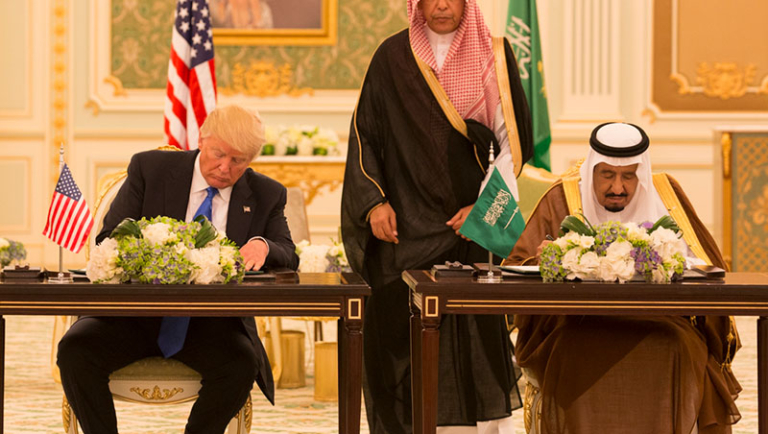
On November 5, former President Donald Trump successfully reclaimed the White House, achieving a decisive victory over his Democratic opponent, Vice President Kamala Harris. Observers around the world are keenly analyzing the results, with US partners, allies, and adversaries speculating about the strategic direction of the new Trump administration. There appears to be widespread anticipation that Trump’s second term will differ significantly from his first on some key issues and all those affected are thinking about ways to deal with that.
In the Middle East, there is considerable interest in the newly elected president’s stance on the ongoing Israeli war on Gaza, which has escalated in recent months and expanded to Lebanon, as well as to Yemen and Iran. During his campaign, Trump vowed to end the conflicts in the Middle East; the credibility of that promise will be tested following his inauguration on January 20, 2025.
For Saudi Arabia, the United States remains a vital strategic partner, irrespective of the political party in power in Washington. Historically, the Saudis have felt more at ease with Republican administrations. This has especially been the case in light of the tensions that defined American-Saudi relations during President Barack Obama’s tenure, which left a lasting impression on Saudi officials. The Saudis are well acquainted with Trump; during his first term, they found a supportive partner, despite some frustrations. Consequently, Saudi Arabia harbors hopes that Trump’s second term will yield productive cooperation across various sectors. Notably, relations with President Joe Biden’s administration improved during the latter part of his presidency, which contributed to a more favorable environment for Saudi engagement after a period of heightened tension.
Relationship Fluctuations with Biden
President Biden’s victory in 2020 was not good news for Saudi Arabia, particularly due to his prior role as Obama’s vice president and because of the pointed criticisms of the kingdom that he delivered during his campaign such as pledging to make it a “pariah” on the international stage. Anticipating pressure from the new Democratic administration on issues such as the war in Yemen and human rights, Saudi Arabia braced for challenges in its relations with the United States. Indeed, Biden’s presidency began with actions that unsettled the kingdom, notably the cessation of American support for Saudi offensive military operations in Yemen, including by suspending offensive weapons sales to the kingdom. This tougher stance was compounded by the Biden administration’s February 2021 release of a US intelligence report regarding the October 2018 assassination of Washington Post columnist Jamal Khashoggi which, while not leading to sanctions against the Saudi leadership, served as a negative signal for the kingdom.
A rift in bilateral relations existed at the leadership level when President Biden took office. The new administration quickly announced that Biden himself would only engage with King Salman bin Abdulaziz, bypassing Crown Prince Mohammed bin Salman, the de facto ruler. Media reported that bin Salman mocked Biden and expressed sharp skepticism about his mental acuity in private conversations. Nonetheless, top officials such as National Security Advisor Jake Sullivan and White House Coordinator for Middle East and North Africa Brett McGurk sought to mitigate tensions and foster better rapport between the two leaders. At the outset of his term, Secretary of State Antony Blinken indicated that the United States aimed to ‘recalibrate’ its relationship with Saudi Arabia, not to rupture it.
Indeed, as the Biden administration settled in, it did not exert substantial pressure on human rights issues in Saudi Arabia and it affirmed support for the kingdom’s defense against Houthi attacks, but tensions persisted. The outbreak of the Russia-Ukraine war underscored to the Biden team the need to restore some degree of intimacy with Saudi Arabia in order to stabilize oil prices. President Biden’s visit to Jeddah in July 2022 was intended to mark a fresh start in ties. However, his fist-bump with the crown prince and his critical remarks regarding the Khashoggi case were met with displeasure in Riyadh. Consequently, Saudi Arabia was not persuaded to significantly increase oil production despite American requests.
Relations were further strained when Saudi Arabia advocated that “OPEC+” reduce oil production by two million barrels a day in October 2022, just a month before the US midterm elections. Some experts interpreted this move as an attempt to bolster the Republican Party in order to undermine the Biden administration. President Biden promised consequences for the oil production decision, though none materialized. Following the midterms, however, relations began to improve, ushering in a new phase during the second half of Biden’s term. This phase was characterized by enhanced US-Saudi cooperation in the region, including a reaffirmation of a negotiated truce in Yemen that continues today and efforts to address the conflict in Sudan.
During this phase, the United States also focused on advancing a normalization agreement between Saudi Arabia and Israel, which reportedly would involve a US-Saudi defense pact, the establishment of a Saudi civilian nuclear program, and American collaboration in technology and artificial intelligence. Crown Prince bin Salman pointed to progress on the normalization deal in a September 2023 interview with Fox News. Additionally, the US-led announcement in New Delhi the same month of an economic corridor project linking India to Europe via Saudi Arabia and Israel, at an event attended by both the crown prince and President Biden, was seen as a precursor to normalization. However, the outbreak of conflict in Gaza on October 7, 2023, halted any substantive progress on the normalization deal, at least temporarily.
Causes of Optimism in Trump’s Reelection
Despite the relatively positive relations Saudi Arabia has maintained with the Biden administration in the past two years, there remains a strong preference among Saudis for the return of President Trump. This inclination can largely be attributed to the personal rapport established between Trump and the Saudi crown prince. In an interview with Bloomberg in July, Trump emphasized mutual admiration and harmony. He further praised the crown prince in an October 2024 conversation with Al-Arabiya, a Saudi-owned news outlet.
The Saudis are adept at navigating their relationship with Trump as a businessman, and they have sought to maintain ties with him even after his departure from the White House four years ago. Commercial engagements have persisted, including the Saudi Public Investment Fund’s $2 billion investment in Trump’s son-in-law Jared Kushner’s private equity firm, the kingdom’s sponsorship of a golf championship hosted at Trump’s Miami golf club, and plans for the construction of the Trump Tower in Jeddah in collaboration with a Saudi real estate development company.
Beyond personal dynamics, there is a belief in Saudi Arabia that Trump could significantly aid the kingdom’s efforts to diversify its economy away from oil dependence and attract American investments in major projects tied to “Vision 2030.” Trump is not expected to raise human rights issues in discussions about and with the kingdom. Additionally, his anticipated tougher stance on Iran aligns with Saudi Arabia’s long-standing desire for a greater American role in the region and reliable security assurances, although this may be wishful thinking given Trump’s isolationist inclinations and apparent desire to minimize the US role in the Middle East, especially when it comes to armed conflict.
The experience of Trump’s first term provides further encouragement for Saudi Arabia. He established a strong relationship with bin Salman, making his first foreign visit as president to Riyadh, where he was warmly received and signed cooperation agreements totaling $400 billion. Saudis very positively viewed his supportive stance following the Khashoggi assassination and his campaign of “maximum pressure” on Iran, including withdrawal from the Joint Comprehensive Plan of Action nuclear agreement. However, disappointment arose due to his tepid response to the Iran-backed 2019 attack on Saudi oil facilities at Abqaiq, where he did not impose punitive measures on Iran, opting to issue verbal threats instead, and declined to pursue any US military action.
The urgency for Saudi Arabia to secure a defense agreement with the United States illustrates its need for clear guarantees of protection against external threats, a priority that may carry over from the Biden to the new Trump administration. This would complement ongoing efforts toward normalization agreements in the region, building on the Trump-brokered 2020 Abraham Accords. Furthermore, securing advanced weaponry from the United States may be smoother under a Republican-controlled Congress.
Trump is expected to actively pursue normalization agreements and foster a regional alliance between some Arab nations and Israel, with the goal of safeguarding American interests in the Middle East and countering Iranian and Chinese influence. He will likely advocate for robust economic relations with Saudi Arabia, capitalizing on American investments in Vision 2030 projects, including a significant deal with Boeing for the development of a new Saudi airlines fleet aimed at global competition. Trump may also emphasize the importance of pulling Saudi Arabia and its allies away from Chinese influence while collaborating on oil price stabilization strategies.
The Broader Context and Challenges
The current perception of Trump’s approach in the region remains unclear, particularly in relation to Israel’s ongoing conflicts in Gaza and Lebanon. This uncertainty could have significant implications for a normalization agreement between Saudi Arabia and Israel. If Trump aims to expedite this process, he must address the need for a resolution to the conflicts. The Saudis are seeking a credible path that advances the establishment of a Palestinian state as part of the normalization deal, necessitating Trump to negotiate a suitable arrangement with Israeli Prime Minister Benjamin Netanyahu to fulfill this demand. But with the Israeli government planning to revive and implement West Bank annexation plans, and formally rejecting a two-state solution, Saudi Arabia may be very cautious about making a deal if its clearly stated demands on a Palestinian state and other rights are not addressed.
Given the complexities surrounding a potential normalization agreement, reports indicate that Saudi Arabia has engaged in discussions with the Biden administration regarding a “mini” security pact with the United States, distinct from the comprehensive defense agreement envisioned in the normalization deal. This arrangement would appear to be a temporary measure, reflecting Saudi concerns about the potential escalation of hostilities between Iran and Israel into a broader conflict that could directly involve the kingdom. It is unclear whether Trump would pursue such an agreement.
In addition, Trump’s strategy for the American economy is likely to promote an increase in US oil production, which could have adverse effects on Saudi Arabia. The kingdom seeks to elevate oil prices to meet the financial requirements of its Vision 2030 initiatives. The International Monetary Fund estimates that Saudi Arabia’s breakeven oil price for 2024 is $96.20 per barrel, a figure that is expected to rise in response to domestic spending demands and Vision 2030-related projects. Any surge in oil supply from outside OPEC will inevitably influence market prices and diminish Saudi Arabia’s capacity to regulate them. Saudi Arabia also faces challenges in achieving the desired level of direct foreign investment, and there are no assurances that Trump’s administration will positively affect American investment in key projects, especially given the ongoing conflicts and regional tensions that deter investors.
It remains uncertain whether Trump will revert to his previous stance on Iran or pursue a new nuclear deal with the Islamic Republic. It appears that Saudi Arabia will continue to adhere to its strategic hedging policies toward Iran, seeking to avoid direct involvement in the ongoing regional conflict.
While Trump’s potential return to office is viewed with some relief in Saudi Arabia, it does not guarantee an absence of future challenges or negative consequences stemming from his economic or political positions. However, a clear and effective strategy for engagement could facilitate a more manageable relationship for the Saudis moving forward.
The views expressed in this publication are the author’s own and do not necessarily reflect the position of Arab Center Washington DC, its staff, or its Board of Directors.
Featured image credit: Flickr/The White House

